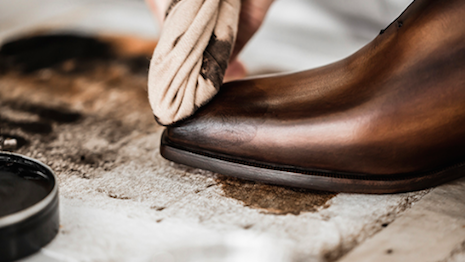BRUSSELS – Consumers today demand more from the brands they engage with, especially when it comes to transparency.
As consumers increasingly desire to engage with brands that align with their personal values and in whom they can place significant trust, transparency is the best way for those consumers to understand exactly what a company is doing. Speaking at The New York Times’ International Luxury Conference Nov. 14, Antoine Arnault, CEO of Berluti, spoke about the specific challenges facing the luxury world in this area.
"The fundamental question in corporate life is: is it our duty to reveal all our secrets?" Mr. Arnault said. "It is understandable that luxury is the particular focus of a demand for luxury.
"Yet precisely because they appeal to desire, are luxury houses the ones that have the most to lose by revealing all?"
Transparent goals
Consumers today are rightfully distrustful of large, powerful corporations.
Big companies seem to control every aspect of life today, and whether it is Facebook, Google or Amazon, these corporations do not inspire much trust in today’s customers.
This is especially important to consider now that these consumers are specifically looking for brands that align with their values. For that reason, transparency and honesty are key to developing strong relationships with consumers.

Customers want brands they can trust. Image credit: Berluti
"The question for luxury brands is are the questions raised by a few voices today destined to be raised by the whole society in the future?" Mr. Arnault said. "If so, we must address them sooner rather than later."
Mr. Arnault points to a recent effort at Louis Vuitton where the company opened up 30 of its workshops to the public in order to show exactly how its products are manufactured and let customers get to know the people who make the goods.
"For luxury houses, transparency is a result one obtains rather than a goal one seeks," Mr. Arnault said. "Transparency is a reflection of the authenticity of the brand and the sincerity of its people.
"If you have a good relationship with your product, your environment and your workers, you will be sincere."
Meeting expectations
Modern consumers are now empowered to discover their own tastes, opinions and preferences, rather than being hugely impressionable to the powers of everything from well-worded political manifestos to the tantalizing imagery employed by luxury brands.
As a result, this consumer is no longer so easily enticed and seduced. They expect more considered communications from figures of authority, which are sensitive to their more discerning tastes and in line with their elevated expectations (see story).
For example, Jeweler Tiffany & Co. is enlightening consumers on how its diamonds make their way into its blue boxes by charting the stones' path from the time they are unearthed.

Luxury brands must hold themselves accountable. Image credit: Berluti
Tiffany's short film, "Journey of a Tiffany Diamond," travels with the gem stones as they undergo both careful refinement and an arduous selection process before being set into the brand's jewelry. Consumers are increasingly concerned that the businesses they support take responsibility for both people and the planet, making opening up operations in this manner a way to create additional appeal for a particular label (see story).
"Even as we speak society is changing and circumstances are changing as are methods of destabilization," Mr. Arnault said. "Companies must adapt by applying principals that can be changed over time.
"Transparency, authenticity, sincerity are the three points of a luxury house’s communication triangle," he said. "Though they overlap, they are not the same thing."
{"ct":"MI1IRS04ehEM3jR7hTwh9MaICAtYxPdo\/6MFBRPDodK0taQGpwJbUpgOnPQLHq2UBJxPelLCR\/frFNwrCfPHr5RlydQP1tcHh52T1nLLdMVApi47nJy5JVw2cdEaVcXP\/2JbLBW\/AcxVZav3n2Ugywiw8XJChhBsX+or\/x+XjaJCCLEOjoCrIhFMInDzsk+sRdTCgxiJy2jDZi72mM5esMnL+d3xI5dR8hJ\/rDI9WEz13R177yjQP+VrI0pyUIvxf9+jCUNKolVHSge2BmsYCecT9rbQ3m6EyzfMZj1kWjGACyG3259Ka9Yw9OPeGumxtvfsYx+fxjA3HB4mN8iAYyVA9buSAfIizHL0VHukzsPU\/3ZIK3qs8S\/3qrnwCBmFWeT+ObePRdW+d0GDkcyHCcweHk+loUpc05\/fBnZnNNo8OU2oVwRdMUDAflzlbADUzD2c8DlZ1g+S1oTu44k+iv9dG3RTBcWtxnR6zBeDcDWSqCjchatxxd+m4pNm2PFjzeBJb0eUattWVyID85LmdijwFhZahjof7GIy75zt+nbCa8cls4nOcSl4Hrj+DHe6jtol3qpCbK1Kw0i\/GX8J+4r7n4YeIOR6opSkWYE1zrKYrdA1iikYbkdkQsn+WUWXAg0sSx5OSSdzxMdSQz3N6O6dJbd05opoipX5v2KPqDcrtNyGm30mecKu76h+2TZHmtYDVBMJ6TK9K2PUWscBVhhuGnpqkmCejsQu0NOqkz7Z2oilJFAmr4+I7LdOm+VpmEOc2xhGQN8a3Tpdmtzi6+GYcee4mV8WMLA9CSdmV\/NBIzg6B8Mp\/\/n1sDjh8NzuR7pu1U4zUKcmfqP7FTxh13KYtQSKtz1EakwDuW\/DvomFXfCqIuOAUniEqx+CugTNUJyAgrzpOlpskhQdWnZ2yjxJgaxwsc4cuzGPEMgzs3GcbgQpt\/haSF0QeKXCPCF6DNhX6ke1znMSGeMxle93PsvvPNsFo3GwnU88d5WC5bcacpR9Rf6DKI0b86kcz+E\/+v11vP9muGzYjIBOdC9TcXzlSeFO5vqwWVRYvZ9Gc3YyYiQf0Ur5XQVrYPe4DrIijPP1UAhJnyjLsXVV4fqYQJ2rkm7Y3vMNewvkxp8+y1CpRtl\/AVxvikn08UX5Y1I4Yy6Ewvi1+sKXMC3flPYT0IOLvrcdLGfqd4tKE3y\/kL5zQDbyQwrUh5+zrlxqmHrzJvvYKT2gGR6gln7CmSL5VUdBcljLR6mMgJyYHde9RPIs8KZaH\/pwL5Huzwxsaex1CNw6fPMv\/Fopay\/GJEdATWGOok8FHfmcc7EVIeNWB\/SLtUQ20M90grM4gtMaqgwXZ9dGtY4vD8BjQGJozJUp7BEFvDXkEXLEsI0yClvCE2uEzAV5K3NhCfxZjrA2vMZzZbyWAVTsTJbORjB6ur4qbBkO6l+0r+Rvq0E\/y9dUYBppOZrJTV4WkX7D4n\/igDkCaS8zk5sUzIzyC4DqGiirMzbMB6YIuBXMlyMdQukMkunjVBopbQagnfigBbuWzbpooCEeXmqXhmP2FnsjV\/\/2LPbWxuVlUbj\/B8jVQG83Ha2KjPCgU60uc7zIVLG8rcNK9VWT3jddqA8WZWQHVoBvL21CJ762f4s8sjjYvAPcjiMX5vEjz5kwpV+CTKXO2pH5xxmL6LkUF1lj\/Tj47mpvrx\/FhfGTY2mVwnNGE0yHynA+h8AWtMwjsf+m4HwKUWc\/Gr9U6TuvTBSjzJhc9cxolemjecWpzHhQ\/n1nVGXpWkbdcAwknkrK1zoVCPoPDBCMIhOCeykVqeREcDgsRJni38yDDvYSX1WQgvTXb5fSteIm59Qo2JkHEDaM5GIbjbIbCNWtQEIhYolR8oIsN3N7HnhJbLxLIZIHIK9WiNai6syKsjh8YDWP2rtzLrpjrk+otE+JOnJJRjBoGZew1q8SPn9AjTBjlPIY4QvAy6fGt2KeU2m+DEKG8FrbE\/gLNsSadNvuf2kiJ+uudUPfeB1rpcjUfzq6v1\/ddTpgoyNOuSN47KPru12H\/1T24UInBs76zYXeG6JUaugw9w20TPXwwioa6jpfApXMhQgmq+2Lrv6oaRonGBAh\/K33uNPycsBklqyZIhgM6H5Jmy2AT0abnIc506NU0kRRTlpKzQ8O\/exeAl681MXHHhLiom0i5Af33pSHl8Cep\/9hI2HLwoHhe7lxLqNCgi1n9eJTJueGo7OfZqNo84yu9HuIqaWP+R66vHdLp5m4z8AT+06QAZGZqZXjZHxrr9W1RmgiD31s8RUkceopyRIUdoLU0uDc6HJZXK9Vl77YJBZeNV8DBuVRnWutILi\/bICT8tQqfsjBa8FcSYeCWr5JsIws69AnfbOJQH0McJrwheSc7QIgV4TDzZObIe15lqUISu0Gs28UiLHiIh1FonseaigyEhckKdTeOlw4E84gdP5Mh4bCwA1gTMfEf5cBe0PxqGuyNVwwPejiLVkkxyxbpfjxbf+9WjGZYSXRa1Gc6SrtvSvdpaBTydb9hhgYVwKS4fYb2qOVaI1HFwv9Vmqpi5lBcvLE9xh+TnIUx\/mUd94vAYz3yqvQ4\/px3TzrdgBEHyjAT5Vd\/NfocictM13o+I1C\/snATjnxbYlanHHqMFWNO20gwaCsyvZWgAi3aGsosvmBNhiqSzXV8GAbRgj55\/7BklcQHQGPNItLVRkP1OXNSkP6icm3JbcuRo5TJw4CnvJ0PRnPXadjgGZiuwgVENOEvmq5pp0JL0JY6\/hVoxk5xEUFIoWrDD8TZZyORxe384Ka\/qSiampsUc4I860weaKFhKYEMTBFsoND2b1jagvEdsftJv56ydfb5zt0hYRNXKZdUEFO8+fXPbzc7BGzWW5lBzZIkFDXM02lsw\/IyfXLnkFdA5gLUoKkuxdjhM68FZ9L4CFRVhGcUc41wKjwc3+Jjw6zHX33o37VOxl1pnAYJRIqfK86tDK1ZxpgUwRvBcbuaEdpy43uoEkpTAbHsH2JRc9lI2U1Fy6Hn9WtXQVcQCz1oH2xOPDv3zdk3tVpOEHWSSEqR4B9JLxn2kYznvSIzGdRc5Elu6SDCFUeempzuQtEYQCalYGF5lPALl9aTiLA9JEVJrwteuexw1BBfHSF0\/KQpIA+nb8pEgMxMLeiYlVJ5DA9ZUkfUSZgT2Z19NblfKYxTbKkBkeoeWtHjxcxAaMm5LOVWuXe14ufm4CpKXb8anOBS2TBgQclsv5GCXWJPvkFaAqs5fJLnq910RerIP8VljyJso\/5+2LvPuOX\/yECTh55ptFEEAq5ZMqGW2IIHkUiX6kxI94fmLRI5gcxtCsSIRF5ny3S3E2Burrxo+eFlBj7OhhM24oCv2bKBLKBIMsrgPj1Ti0VhW8A9ty\/+sPpP7w9EU2XyR3dJxJucGd5HO8r5qyOz7dcDvhjbi7QXSbbMmZEK1tJH2sFcj6dwhV\/1sJXlBo2RcyV3Wnt\/0PDiPKvumb0kbIfYNJaWHG77MDsU5QE1gRLvS7uf0ClFLALk7BPEvHifsEkw+8Yl0iq2V726MFKIafo\/gWnwqDw+WKs9RxnjIuMaqq43zS7TOiJkjqRRnAV4kQFVGOjAh7HZ7ZhtyrGNQ9wklMN60NAm9mi7mpWnpYS5Tdq0XN+dScNRmHEF6tGEeMqnUrWlHScAY0F+ozgfmal6Mk081UHFCMU8F\/Y11fDPHq9fEk\/9PJDhny1lcblfgNjf\/CxDq\/OY\/QoDHszz1rpZh2fu7gOtvbwwvyEdSq6mDiS+QVP5RSddrl5P7U1TCH0K7xYFVH\/\/V4+iVOd+mMCqtS\/T2yWtto\/ZGNmwcw1DpoSIzeE5UDPLMmif+jstzIyHxkrlggHQvwduJ9sDJw\/\/Qw+MC9ZgUDbeGqivy5\/rjcvDSSdONaC7dG+k+Gjzb5xnFYbj8r7mf5waI5455f\/AEAJCfq5sRGTsRYNLXTzHkvBPIXBq0K7lw4jFxxIbY9vjUOPIQhYGZH2uWbvGEEcYizxvMQpf7TTiKVayoY3g8oYSMAUq2oTNCwvG0myn184GGNkdgUqXQHW+ufWVdrDXwsB8dtgNXd3EMKvaHHzCqD4CFP4Sb\/Z\/HTQ0tb5+7jRy9EvpJeW4F5lvygKLWmpYhf3q6koknYLc+U45n7+UOGNJ6bb2kKrKYSuZtCSuMAhcIYa1+YoKcb\/Z3wvfv9S8pKCiRPlRGH02a11Dl+QoYrq4Qyb66em47V7OgHFFItrOW53chesuaNFxDRi9gcMHKcIHRjy1OO2fExkCQDQNpNCIx\/NPalhaoQ+ZZguoiiayZAk2KoHU1xj0psQynBzdCf8KU8P3Cr93HIuJxlpj9eikv+EwL4QyF6yagxdHGlRKMZO+m1ITEuofNKi00p2lMBWbvZF3LrK10MeGh6htAOrUFT02If6sZ+YpwpuKa1b1KtJB3ohsCNGr\/tcyff+uOPs7l8up4FPF00mTyHMHfgBJma5nnZPfhbgL4jalrHcFy8n4vHhzH6KOf2APBhrCXni0PpkJwVxLj4KbBl7A6GO2Wws+OOwPPN6OINuB8zMfEqvlKXSoJsTGXCfDyO+ePh+YvhOadobenSYCgCrZ0HkDEGEyx++qre5kweXP+ShAPpsYhY1bDXbK7i\/zJADZB2ymgCf12dMmxQjPkLVNcRJDSD+D9GL6\/ip49Vf8RA97OcmjXHLrAkqqs7Do6dnpRtk1yoK2s6Uqypym4GweKYU27ccTDDP5+OnD2nogpQima7tq5\/ujjkipQy0NhJ9VyOujAkf6ZSW9dwB2rGEgt51ijMpe7YyGzHgQvG3On78NqeU3pNlhFnNPRYFV2EwO3Adp3o2QMLIDqYWMTwCQAfrUJlTwyMsAv04\/FfgjeAeSY8gKRlRdW222uEwJFYEUjaW3kpZoQ+vPXroCGboztM4fRhCeeOc5P9f0HzbEjQ+S42XMsoz88VUUChuxm1RGQzJvXbrz0FFerqhnDlUktLywospWSUDyk0gKJ7Ym4zgXAQdm6HwLVf4KCiG38e9E4NTqwyhPsYdZYqyUJX9wAEW\/EN20rsqqfl4W+zWY3qONOacmUIUkoXATbmT91jTh3Rw7Ft0E2W8NkBeDE1W6KckCJizvFRFGyMBiL5\/2FKyNzDR7xjUuvntyvfKh2yKaF4wlkt2jB9bat7utBT6UhsVAzdKNMVW0tubvPPNQ09YhwFU5dSwWyD7YfkEiPa7v1VW2y8zyzmkYiObjfbd9BqqNVsCGvGHGenwnhj10yJEc3jjy\/UDPJMkMIT4LQVJ68rMmrqH2WxXbA6goBFQmLsGd+vzUahHIIu8etbg1iZJ\/CLjTfxtwNYNTrLfz3jVdgh6IWVzyplyoGW2Qut9FAJyCCH2hd5k3\/rV80hHqccAbq+aObqk1Xn4PRtVOGpIqPm\/Ub0ojOtcYxCa2\/xxWDpv554JkBzHDNgGg5KEGTHv\/vEYLTSqezah1ZplTNBHbEXLWaaePLSZHGi9yEFherhC2m2Nl1OQaPm1P45Z6wtkse8conFts3I2jvuo6Z7xFOdkDHVNykaec9b1NsMxQVOogpOMWkKouEK2h6vdrpPN6d83R1wY3H8cvqneh9CcJzU\/YaeSqcTUQcqc3Fve6FsHPTxFGrnL1Ib1kEwZIyXod2JHirNXAAiigDkR7jFXRDGYFQi\/KCJQeQtXQ61+FtKfe2NbSDLCwRqx4su6eKmCDXoE+D0lKJdV4ZhCYtFLG9JlzptbfWNMXFyeIybaaR9Clo2JL25eqJVaCG4iXq1SxBhUWIbBUqPxREwdqZ\/y\/bgBpPt7Wq2xjaEyAyi0E2A31Kwtq+uE3azK\/ySkd2rMFC0HV4Xk9D7wrxNmBAVx2WUWbmug1FfmHep60EcKhlU4AyXQD0xonUkKnxgnXO\/4LhDYAFk61DoA4z13rzn0ImqhOKCSoWPViz9u8OXhbjKrM32Ov2\/3nh0CXfdDHhOQ03sISjSZJDa0lGSe8nAzsAbM0ErlZaC6nV3mwKK45ZtmB6tvpw4n9\/C5cxPYWZCMAtjEXXHmGhEEn47DZI8jdhhW61Tg01QmqPz+SZFpy8TpQqoLSkpN+FyDaxUH8lhDR298m6L2mi6\/EePp9cqJruqWkwHqosskdBGb1jEa+xkyxKlilAzdT2AeBhrWef1qboCrpOv9e0fYihyAXZJ4jZ\/IV+9PsxDfY7c4QtpuUY2SYETWEE\/UmZwH1ifmXClRNBO\/J8ueDfzyU+jOCwmc0sCh+F+JTXdoTl5tgKee5l8Sg7TeLsUrt8eGY\/kzXbSJ9TxDqXz6Mt90gwFFE0NFucrsIDG8SinDaXcH42VF8sC8FcmyGU0pDe9BZ57kbqp6Ieg4zEm1AWAjdv9\/8SP8nzJf8bgCnm4HEX\/KKsQFCiqmnk+FrEp+YZ9lipA1MKA4wrJNyuQzoFJ9pBsau9uc8OQn7iGvhDfPSphfRdHRpsRIzd20EFE8hCse5rAmiAJeWgXrWPXYE3i6GZSnJEC33eqZZYgDaNzoac0ZS9sIX6Ngi8gN1vTxwQFyMJLiQUe0d0qVUKPDwwUcwN38\/fGJdpiXcwwAnf0qTEzWfFHMpqDQ3eaWlrPFbXAs7cHxdfb7+Bl1SJRcQzCHa+WU\/9ZH\/yFpwn84wTohyDAytAOM\/j5qPjWEVw6+0xhScz7xB1F052gk8jIOYqvSzd4AJEWz69xP9OupToaSS1TiInnx3uRH5AeVD63SSvk3dG6gaHJGNvmy7BA33RmwOCRkL5RS7hVDoYT1Fl5w7ulsNPvqxE64Hn8kILaQzVtfkdbjkW5p7xBzFNWIDqudg18KN4UZDou9kl2icxC8dyMBI7bYWtIqrmpIZKjYLJufCN4LEArw933n8Xex2mhYVkj\/DPkhVHYDm4kM8vDKY30=","iv":"5147633b6aa0650a9eb9553f7c3667a1","s":"5208be4b73e51078"}

 Transparency, authenticity and sincerity are key for luxury brands. Image credit: Berluti
Transparency, authenticity and sincerity are key for luxury brands. Image credit: Berluti